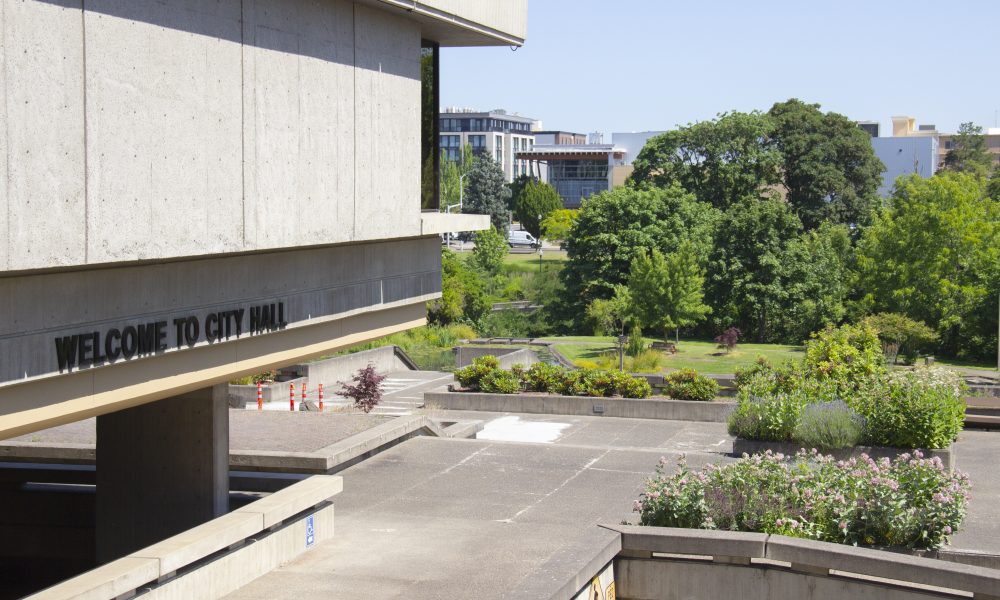Four current and former Salem policymakers have formed a campaign in favor of the city of Salem’s payroll tax, which is set to go before voters in November.
The “Save Salem Campaign,” which the group announced Wednesday, is led by Salem City Council President Virginia Stapleton, Planning Commissioner Michael Slater, current Salem Citizen Budget Committee vice chair Dr. Irvin Brown, and Paul Tigan whose budget committee term expired in June.
On July 10, the city council approved a 0.814% tax on wages earned in the city above minimum wage without prior voter approval. It was passed with a 5-4 vote, with Stapleton among its supporters.
That same week, Oregon Business & Industry, a statewide business group, launched a petition to put the payroll tax before voters in November. It met the threshold for 3,986 verified signatures on Aug. 11.
“This is a grassroots campaign about what’s at stake if we as a community fail to address the nearly $30 million dollar shortfall coming within the next few years,” Stapleton said in a Wednesday press release.
Now that the tax is heading to the ballot, state law bars city of Salem staff or city funds from being used to campaign for the tax, leaving the effort to volunteers and elected officials.
The group plans to launch a website at savesalem.org in the next few days, Stapleton said in an email to Salem Reporter. The group will also be setting up Facebook and Instagram pages, and a calendar of in-person events and volunteer opportunities.
“We welcome the opportunity to educate Salem residents about the General Fund and how the revenue collected from the payroll tax will put the city on a strong financial footing,” said Brown in the release.
The tax is expected to bring in around $27.9 million per year, with the majority of the funds going to sustain and expand staffing and services at the police department, fire department, and services for unsheltered people at the newly opened navigation center and micro shelters.
Councilors who supported the tax said that without it, the city would likely make cuts to community services under the general fund, including the Salem Public Library; meals, outreach and activities at Center 50+; parks and youth education and training programs.
In a July email to Salem Reporter, councilor Stapleton said part of the reason she opted to approve the tax without taking it to voters was that a campaign would require a large amount of time and money.
“Having just run the bond campaign, I believe the prospects of raising that amount of money and finding councilors willing to spend the time necessary to run a campaign would be virtually impossible,” she said.
Councilors who voted against the tax said that they wanted to see the issue taken to voters who would bear the costs, an average of $42 per month for a Salem worker earning the city’s average wage of $29.90 an hour.
The city points to the state’s limits on property tax revenue in the 1990s leading to a gap between revenue and expenditures leading to the anticipated budget shortfall.
The “Save Salem” campaign said that the payroll tax would grow as the city population grows to address that gap. Without it, the city would make around $15 million in cuts.
“It’s no exaggeration to call this campaign Save Salem,” said Planning Commissioner Michael Slater in the press release. “We are at a crossroads. On the one hand is a future where people continue to enjoy a safe and growing community, and on the other hand we face a future that doesn’t look much like a city at all.”
Stapleton said the group has begun to ask for donations, and has collected a few from city councilors in favor of the tax and from the campaign’s members. As of Wednesday, no funds had been published by the Oregon Secretary of state’s campaign finance page, which requires that campaign contributions and expenses are filed within 30 days.
The group will be campaigning against a well-funded opposition.
As of Wednesday, Refer the Tax on Salem Workers, the campaign to put the tax on the ballot, had raised over $134,000 in cash and in-kind contributions, chiefly from the political action committee for Oregon Business & Industry. Other top donors are the Salem Area Chamber of Commerce, with a $20,000 contribution, the conservative group Marion+Polk First with $5,756 in-kind and Salem law firm Sherman Sherman Johnnie & Hoyt, with $5,573 in-kind, according to campaign finance records.
Contact reporter Abbey McDonald: [email protected] or 503-704-0355.
SUPPORT OUR WORK – We depend on subscribers for resources to report on Salem with care and depth, fairness and accuracy. Subscribe today to get our daily newsletters and more. Click I want to subscribe!

Abbey McDonald joined the Salem Reporter in 2022. She previously worked as the business reporter at The Astorian, where she covered labor issues, health care and social services. A University of Oregon grad, she has also reported for the Malheur Enterprise, The News-Review and Willamette Week.









